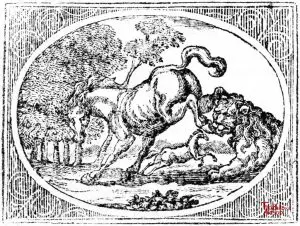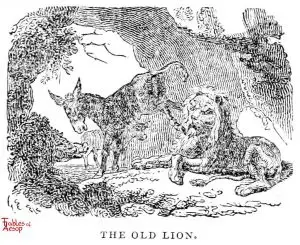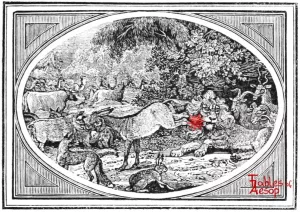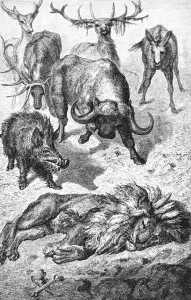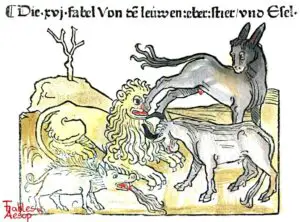An Old Lion was near death so animals that used to fear him came and abused him. Sadly, the Lion could do nothing to stop them.
Only cowards insult dying majesty.

Eliot/Jacobs Version
A Lion had come to the end of his days and lay sick unto death at the mouth of his cave, gasping for breath. The animals, his subjects, came round him and drew nearer as he grew more and more helpless. When they saw him on the point of death they thought to themselves: “Now is the time to pay off old grudges.” So the Boar came up and drove at him with his tusks; then a Bull gored him with his horns; still the Lion lay helpless before them: so the Ass, feeling quite safe from danger, came up, and turning his tail to the Lion kicked up his heels into his face. “This is a double death,” growled the Lion.

Aesop For Children
A Lion had grown very old. His teeth were worn away. His limbs could no longer bear him, and the King of Beasts was very pitiful indeed as he lay gasping on the ground, about to die.
Where now his strength and his former graceful beauty?
Now a Boar spied him, and rushing at him, gored him with his yellow tusk. A Bull trampled him with his heavy hoofs. Even a contemptible Ass let fly his heels and brayed his insults in the face of the Lion.
Moral
It is cowardly to attack the defenseless, though he be an enemy.

Samuel Croxall
A LION, worn out with age, lay fetching his last gasp, and agonizing in the convulsive struggles of death. Upon which occasion several of the beasts, who had formerly been sufferers by him, came and revenged themselves upon him. The Boar with his mighty tusks, drove at him a stroke that glanced like lightning. And the Bull gored him with his violent horns. Which when the Ass saw they might do without any danger, he too came up, and threw his heels into the Lion’s face. Upon which, the poor old expiring tyrant uttered these words with his last dying groan: Alas! how grievous is it to suffer insults, even from the brave and the valiant; but to be spurned by so base a creature as this is, who is the disgrace of nature, is worse than dying ten thousand deaths!
THE APPLICATION
He that would be reverenced and respected by the rest of mankind, must lay in a foundation for it of some kind or other; for people cannot be persuaded to pay deference and esteem for nothing. So that though we have lived in good repute in the world, if ever we should happen to outlive our stock, we must not be surprised to find ourselves slighted and affronted, even by the vilest scum of the people, if therefore we would raise to ourselves a dignity that will continue not only to the end of our lives, but extend itself far down among the ages of posterity, we should take care to establish it upon a foundation of virtue and good-nature: this will not only preserve us from the insults of our enemies, but upon occasion, surround us with a trusty guard of faithful and sincere friends.

Thomas Bewick (The Old Lion)
A Lion, that in the prime of his life had been very rapacious and cruel, was reduced by age and infirmities to extreme feebleness. Several of the beasts of the forest, who had been great sufferers by him, now came and revenged themselves upon him. The Boar ripped him with his tusks, the Bull gored him with his horns, and others in various ways had each a stroke at him. When the Ass saw that they might do all this without any danger, he also came and threw his heels in the Lion’s face. Upon which, the poor expiring tyrant is said to have groaned out these words: Alas! how grievous is it to suffer insults, even from the brave and valiant; but to be spurned at by so base a creature as this, is worse than dying ten thousand deaths!
APPLICATION.
When men in power lose sight of justice and mercy, and cruelly and unjustly tyrannise over the people under their sway, they never will gain sincere reverence or respect from the rest of mankind. The injuries they inflict in the hey-day of their wicked career, will be remembered with detestation through life; and when age and impotence lay hold of them, they must not expect to meet with friends they never deserved; but may be certain of being treated with neglect and contempt, and the baser their enemies are, the more insolent and intolerable will be the affront. It will then be discovered, with bitter remorse, that the days have passed away, in which virtue and dignity ought to have laid the foundation of a reputation which would have been the solace of old age, and also extended a good name to posterity with feelings of veneration; instead of which the remembrance of past crimes will haunt the guilty mind, and the unjust man will at last be thrown into the grave with the common dust, amidst the whispers of “Let him go,” and he will be no more remembered than the animals on which he feasted, or the herbage which was cut down when he was a child.
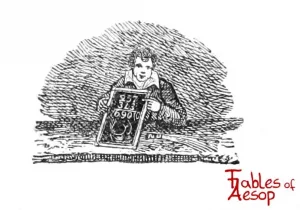

JBR Collection
A Lion, worn-out with age, lay drawing his last breath, and several of the beasts who had formerly been sufferers by him came and revenged themselves. The Boar, with his powerful tusks, ripped his flank; and the Bull gored his sides with his horns. The Ass, too, seeing there was no danger, came up and threw his heels into the Lion’s face. Thereupon, the poor old expiring tyrant, with his dying groan, uttered these words: “How much worse than a thousand deaths it is to be spurned by so base a creature.

Townsend version
A lion, worn out with years and powerless from disease, lay on the ground at the point of death. A Boar rushed upon him, and avenged with a stroke of his tusks a long-remembered injury. Shortly afterwards the Bull with his horns gored him as if he were an enemy. When the Ass saw that the huge beast could be assailed with impunity, he let drive at his forehead with his heels. The expiring Lion said, “I have reluctantly brooked the insults of the brave, but to be compelled to endure such treatment from thee, a disgrace to Nature, is indeed to die a double death.”

L’Estrange version
A lion that in the days of his youth and strength, had been very outrageous and cruel, came in the end to he reduced by old age, and infirmity, to the last degree of misery, and contempt: insomuch that all the beasts of the forrest; some out of insolence, others in revenge, some in fine, upon one pretence, some upon another, fell upon him by consent. He was a miserable creature to all intents and purposes; but nothing went so near the heart of him in his distress, as to find himself batter’d by the heel of an asse.
Moral
A Prince that does not secure friends to himself while he is in power and condition to oblige them, must never expect to find friends, when he is old and impotent, and no longer able to do them any good. If he governs tyrannically in his youth, he will be sure to be treated contemptuously in his age; and the baser his enemies are, the more insolent, and intolerable will be the affront.

Heinrich Steinhöwel (Of the Lion, the Boar, the Bull, and the Ass)
Perry #481
